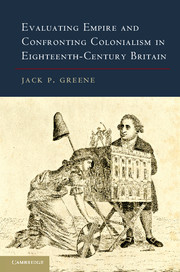Book contents
- Frontmatter
- Contents
- Preface Confronting Empire
- Prologue “Scene of a Foul Transaction”
- 1 “The Principal Cornucopia of Great-Britain's Wealth”
- 2 Outposts of “Loose Vagrant People”
- 3 “A Fabric at Once the Dread and Wonder of the World”
- 4 Arenas of “Asiatic Plunder”
- 5 Sites of Creolean Despotism
- 6 “A Fruitless, Bloody, Wasting War”
- 7 “This Voraginous Gulph of Hibernian Dependence”
- 8 A “Shadow of Our Former Glory”?
- Epilogue “Against Every Principle of Justice, Humanity, and Whatever is Allowed to be Right Among Mankind”
- Index
- References
8 - A “Shadow of Our Former Glory”?
The Discussion of Empire in the Wake of American Secession
Published online by Cambridge University Press: 05 June 2013
- Frontmatter
- Contents
- Preface Confronting Empire
- Prologue “Scene of a Foul Transaction”
- 1 “The Principal Cornucopia of Great-Britain's Wealth”
- 2 Outposts of “Loose Vagrant People”
- 3 “A Fabric at Once the Dread and Wonder of the World”
- 4 Arenas of “Asiatic Plunder”
- 5 Sites of Creolean Despotism
- 6 “A Fruitless, Bloody, Wasting War”
- 7 “This Voraginous Gulph of Hibernian Dependence”
- 8 A “Shadow of Our Former Glory”?
- Epilogue “Against Every Principle of Justice, Humanity, and Whatever is Allowed to be Right Among Mankind”
- Index
- References
Summary
As in the early 1780s people of all political persuasions began to face up to the probability that the American colonies were unlikely to remain within the British Empire, they had to confront the possibility that such a massive loss might leave Britain with so few overseas possessions that it would, as one writer put it in July 1780, “retain only…the shadow of our former glory” as an imperial nation. Imperial analysts worried about the possible loss of Britain's imperial grandeur and the effects of such a loss on its standing in the society of European imperial nations. They considered whether and how the revolting American colonies might be retained within the empire or, if that were impossible, how Britain might reestablish a profitable economic relationship with the new United States. They also sought to take stock of Britain's remaining imperial holdings in Ireland, in the Mediterranean, on the African coast, on the North American continent, and in the West Indies and Atlantic islands. In so doing, however, they found themselves having to cope with the persistence of conditions that over the previous two decades had called into question the very humanity and justice of British ventures overseas and reflected adversely upon the national character of Britain itself.
Few metropolitan observers were happy about the loss of so many of the North American colonies, and several of them pondered what that loss meant for the future of the British Empire. Contending that “the settling of” the American “colonies at first was unwise, and the subsequent encouragement that was given them highly impolitic,” James Anderson, a longtime enthusiast for the war, produced a long and bitter treatise in March 1782 in support of the arguments “That our American colonies instead of promoting the trade and manufactures of Great Britain, have tended in a most powerful manner to depress them,” that “instead of adding strength and stability to the empire, they have necessarily weakened it in a great degree, and exposed it to the most imminent danger,” and that the British Empire would no doubt be better off without them.
- Type
- Chapter
- Information
- Publisher: Cambridge University PressPrint publication year: 2013
References
- 1
- Cited by



